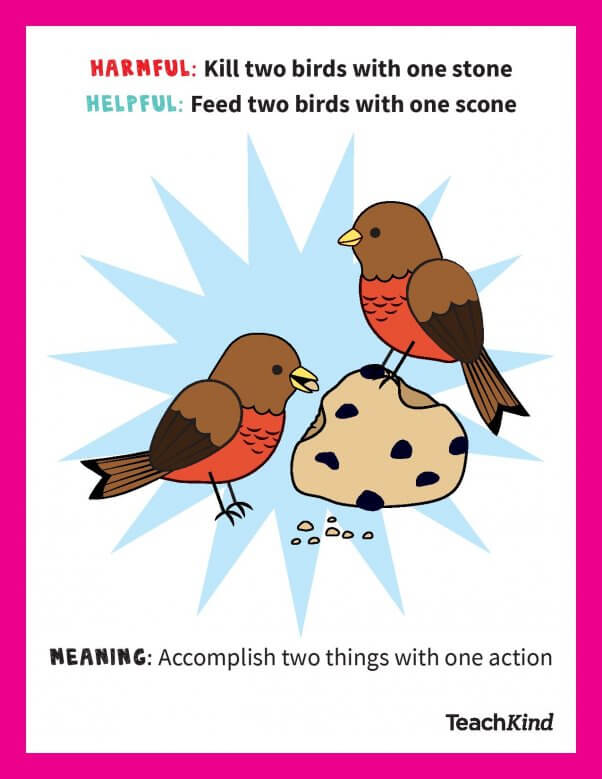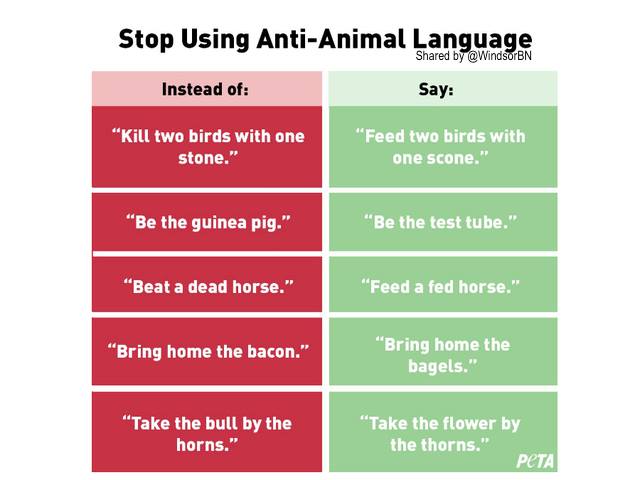
 PETA says these phrases are comparable to racism and homophobia
PETA says these phrases are comparable to racism and homophobia
Meat-based idioms, like “flogging a dead horse” or “taking the bull by the horns,” can be compared with homophobic and racist language, according to animal rights organization PETA.
“Just as it became unacceptable to use racist, homophobic, or ableist language, phrases that trivialize cruelty to animals will vanish as more people begin to appreciate animals for who they are and start ‘bringing home the bagels’ instead of the bacon,” PETA said on Twitter.
We decided to dig into the origins of these sayings and explain their meanings
Kill two birds with one stone
To solve two problems with a solitary action
There has been much speculation about the origins of the phrase ‘two birds with one stone’, with some scholars believing it originated within Greek and Roman mythology and the story of Icarus and Daedalus. However, common consensus attributes the actual origins to be more recent, with the phrase appearing in a 1632 book by J. Morgan Gent. Regardless of its precise origins, the term has become common to describe the act of solving two problems with one action, and is used around the world. Source
Also see this
Be the guinea pig
Guinea pigs might not be the most common experimental subjects today, but we have to look at how common they were when the term was first coined, which was many decades ago, as Etymonline points out:
In the extended sense of “one subjected to an experiment” it is first recorded 1920, because they were commonly used in vivisection experiments.
Wikipedia seems to be backing that up:
Biological experimentation on guinea pigs has been carried out since the 17th century. The animals were frequently used as a model organism in the 19th and 20th centuries, resulting in the epithet “guinea pig” for a test subject, but have since been largely replaced by other rodents such as mice and rats. Source
Beat a dead horse
You use the term ‘Beat a Dead Horse’ to indicate that some action or ongoing argument is useless.
The origin of the expression ‘beat a dead horse’ comes from the mid-19th century, when the practice of beating horses to make them go faster was often viewed as acceptable. To beat a dead horse would be pointless, as it wouldn’t be able to go anywhere. An early written form of this popular idiom is found in an 1859 issue of the London paper Watchman and Wesleyan Advertiser: “It was notorious that Mr. Bright was dissatisfied with his winter reform campaign and rumor said that he had given up his effort with the exclamation that it was like flogging a dead horse.” Source
Bring home the bacon
The origin of the phrase ‘bring home the bacon’ is sometimes suggested to be the story of the Dunmow Flitch. This tradition, which still continues every four years in Great Dunmow, Essex, is based on the story of a local couple who, in 1104, impressed the Prior of Little Dunmow with their marital devotion to the point that he awarded them a flitch [a side] of bacon. The continuing ritual of couples showing their devotion and winning the prize, to considerable acclamation by the local populace, is certainly old and well authenticated. Geoffrey Chaucer mentions it in The Wife of Bath’s Tale and Prologue, circa 1395:
“But never for us the flitch of bacon though,
That some may win in Essex at Dunmow”. Source
Take the bull by the horns
To deal with a difficult situation with determination and bravery. This idiom is usually used when someone has been postponing an action for some time and finally wants or needs to resolve it.
Experts disagree about the exact origin of the phrase. One theory is that it originated in the American West where ranchers, in order to control a bull, would have to catch it. Grabbing a bull by the legs or the neck would not have worked. The only way was to face the problem head on by taking the bull by the horns and bringing it to the ground. Source
Continue reading the PETA story
https://bit.ly/2zJiRIp
